How to clean a washing machine with citric acid: advantages and disadvantages of the method
Today it is difficult to imagine a family that does not have a washing machine.It has long ceased to be a luxury item, and families with small children simply cannot do without this helper. Do you agree? But, like any household appliance, the washing machine can break.
The most common cause of breakdowns is scale on its parts. It can reduce consumer performance and even disable your assistant.
To prevent the problem, it doesn’t hurt to know how to clean a washing machine with citric acid (CA). This method is absolutely safe for technology, but only if certain rules are followed.
In this material you will find expert advice that will help you efficiently descale your washing machine without resorting to the services of specialists. We will tell you how often you need to carry out preventative cleaning with citric acid. In addition, the article contains videos that clearly demonstrate the process of caring for equipment.
The content of the article:
Scale and chemicals for its removal
The basis of scale in household washing machines (WM) is made up of insoluble magnesium and calcium carbonates (CaCO3 and MgCO3), settling on the details. They determine the level of water hardness, and their concentration affects not only the process of scale formation, but also the chemical effectiveness of the detergent.
In accessible places, salt deposits can be removed mechanically, but getting to the scale on the heating element is quite problematic.
Therefore, to remove it in hard-to-reach places, a chemical method using citric acid is used. She dissolves CaCO3 And MgCO3, and does not corrode metal surfaces.
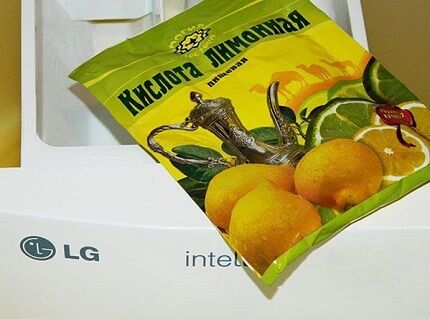
The chemical reaction is:
2C6N8ABOUT7 + 3CaCO3 = Ca3(WITH6N5ABOUT7)2 + 3СО2 + 3H2ABOUT.
During the reaction, calcium citrate is formed in the SM (Ca3(WITH6H5O7)2), which dissolves well in water and is removed with it when drained. It is safe for humans and is even available in tablets to replenish calcium reserves in the body.
Theoretically, to clean a washing machine from 100 grams of scale, you will need 125 grams of citric acid. This chemical fact must be remembered when assessing the effectiveness of the cleaning performed.
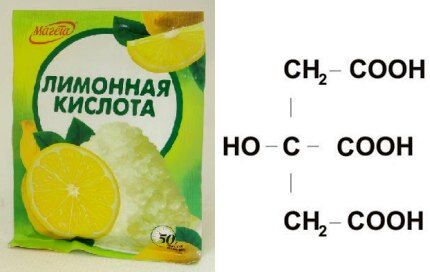
Causes and consequences of scale formation
The scale formed in the washing machine is a fait accompli that requires a response. But we cannot ignore the reasons for its appearance, which can repeat the process of salt deposition on parts.
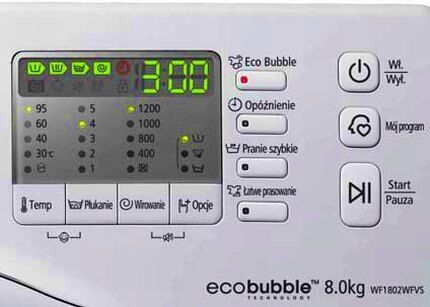
Scale formation is promoted by:
- carbonates, calcium and magnesium cations dissolved in water;
- high washing temperature (more than 60°C);
- use of phosphate-free powders.
The effect of high temperatures is that with strong heating, steam bubbles begin to form on the metal surface of the heating element - the result of local boiling of water.
At the micro level, this leads to its division into a pure fraction H2O, passing into the surrounding liquid, and insoluble carbonates deposited on the metal. The higher the washing temperature, the more scale is deposited in one cycle.
Phosphate-free powders have a beneficial effect on the ecosystems of water bodies into which sewage is discharged, but they bring nothing but problems to people.
Phosphates reduce the overall hardness of water and inhibit the formation of insoluble carbonates, so they are used in special products for the internal cleaning of washing machines.
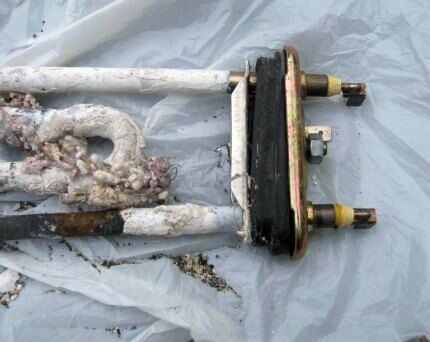
The absence of phosphates in washing powders leads to accelerated deposition of salts on the parts of the washing machine.
Scale formation is fraught with the following consequences:
- Overheating of the heating element due to poor heat transfer to the surrounding water through scale.
- A layer of salts insulates metal and rubber parts from the air, which helps retain moisture in them, the appearance of mold, rusting and reduced strength.
In general, there is little good from scale, so you should remove it with citric acid or specialized anti-scale agent for washing machine. You should know as much information as possible about the features of this method.
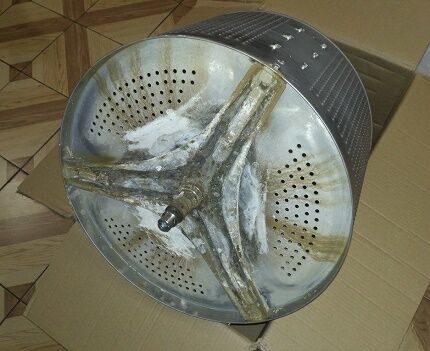
Pros and cons of cleaning with citric acid
The properties of citric acid are determined by its chemical structure. This substance was not invented specifically for cleaning washing machines, so its effect on equipment parts has both positive and negative sides.
Positive aspects of the method
Without cleaning the scale in the SM, you can expect, at a minimum, burnout and the need replacing the heating element. Therefore, there is no need to delay the cleaning procedure. The method for removing deposits should allow anyone without experience to carry out the procedure.
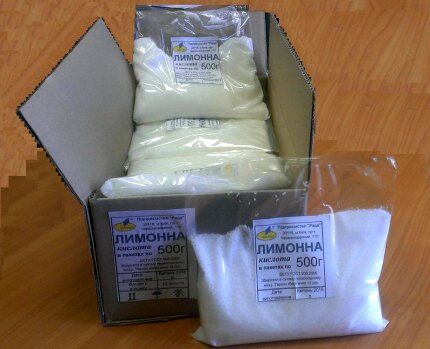
The use of citric acid to eliminate accumulated insoluble salts meets this requirement due to a number of advantages:
- Availability and low cost. Citric acid in the required quantity can be bought in any store for several tens of rubles.
- Simplicity. Even an untrained person can carry out the cleaning procedure.
- Efficiency. 100 g of citric acid will dissolve up to 80 g of scale.
- Safety. Both citric acid and calcium citrate formed after dissolving scale are harmless to health.
These positive aspects of LC make it the drug of choice in the fight against scale. There is no point in buying expensive special products for cleaning SM if they provide a similar effect.
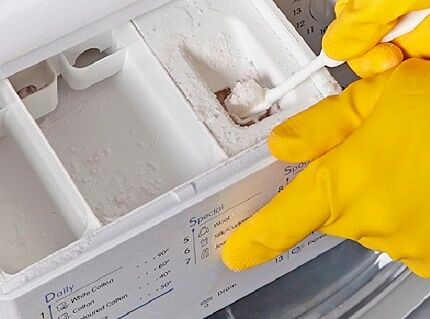
Confirmation of the effectiveness of removing accumulations with citric acid is demonstrated in the video:
Negative effects of citric acid
There are legends about the negative effect of citric acid on internal parts when cleaning a washing machine. Numerous arguments are given against this method, but little evidence is provided.
The theoretical claims of people regarding cleaning SM with citric acid are:
- The formation of salts that remain in the washing machine and can clog the drain.
- The acid corrodes the metal components of the heating element.
- Rubber seals soften and may crack.
- After cleaning, things develop a specific smell.
To remove scale from the SM, a 1% solution of citric acid is used.
For comparison, a 10% solution of aggressive hydrochloric acid is used to clean water heating boilers from deposits. And even multiple treatments with such a strong agent do not affect the operation of the equipment. And rubber is generally resistant to short-term exposure to weak acids.
The problem will arise if crystals or citric acid solution remain in the pocket of the rubber seal that seals the door. In other cases, the negative effect of citric acid on the insides of the washing machine is a myth.
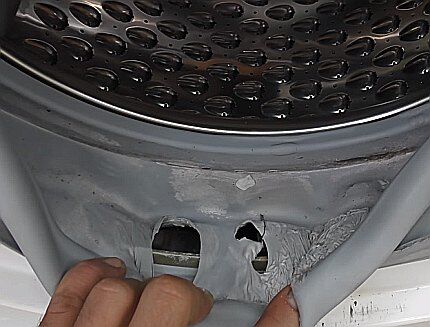
The salts formed during descaling, together with the remaining lacquer, are completely removed by subsequent two or three rinses, leaving neither odor nor sediment.
Are all the disadvantages of citric acid really far-fetched? No, descaling has one more drawback, but it is common to all cleaning products.
Insoluble salts can accumulate at water leaks, temporarily closing the hole and eliminating the problem.After cleaning the washing machine, the leak may appear again. The described problem is not caused by citric acid or other means, but you should be aware of the possibility of its occurrence.
The consequences of using LC for cleaning SM are presented in the video:
Instructions for cleaning the machine with lemon
Citric acid cleans not only the internal parts of the SM, but also the powder box, the door and its rubber gasket.
For this you will need:
- 100 g citric acid;
- a cloth that absorbs water well.
The following step-by-step instructions for cleaning a washing machine with citric acid are guaranteed to help get rid of internal salt deposits without harming the equipment parts.
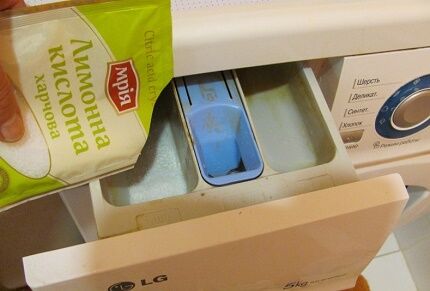
Step #1: Prepare for Cleaning
First, you should check the drum again and remove things from it, if any. Then measure out 100 grams of citric acid for a washing machine with a 6 kg load. If the technique requires a different maximum volume of laundry, then the amount of reagent should be adjusted accordingly.
Lemon can be used in 2 forms:
- crystalline;
- diluted in water.
Dissolved acid is preferred because the crystals are guaranteed not to get stuck anywhere. 100 grams of lemon juice are diluted in half a liter of warm water. Lac in dissolved form is not suitable for cleaning washing machines, which at the beginning of operation pump out the remaining water under the drum.
Step #2: loading acid and turning on the washing machine
The crystalline powder is loaded into the washing powder receptacle, and the dissolved lemon can be immediately poured onto the drum before closing the door.
The longest washing mode with a water temperature of 90-95°C is selected and turned on. It should have at least 3 rinses.
Step #3: Removing Crystalline Acid Residues
After the final addition of water to the machine, you should open the compartment for loading the powder and rub the remaining lemon juice along its walls. If it is not there, then you can borrow some reagent from the kitchen.
After 30-60 minutes, you need to wipe the compartment with a dampened rag, removing any plaque there. The main thing is to have time to remove the acid before starting the rinsing regime.
Step #4: Inspect the Washing Machine
After finishing washing, open the door and let the interior dry. Separately, you need to wipe off the accumulated water in the pocket of the rubber cuff.
Additionally, you can remove the bottom panel of the machine and clean the drain filter, in which broken scale particles can get stuck.
The CM door and rubber seal must be wiped with a cloth soaked in a 1% citric acid solution. The remaining plaque on them should be easily removed. This completes the descaling process. It is important to wipe the rubber seal well so that you do not have to replace the sealing cuff.
Tips for caring for equipment
Professionals recommend regularly using special products to prevent the appearance of scale. This advice can be ignored if every 4-6 months you carry out cleaning the washing machine "lemon"
The frequency of the procedure depends on the hardness of the water in the region and the average washing temperature. The higher they are, the more often the equipment needs to be cleaned.
Inside the machine, citric acid comes into contact only with the heating element and the working space made of metal, plastic and rubber. It and its vapors do not get on the engine, electronic board and other critical elements of equipment, so you should not be afraid of regular use of LC.
Although the process of cleaning SM with citric acid is quite simple, it is still better to prevent the formation of scale than to deal with it later.
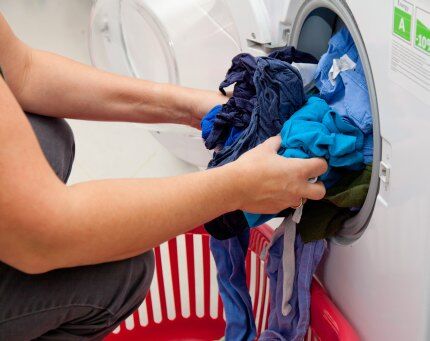
The suggested tips will help reduce deposits of insoluble salts on the internal parts of the machine and reduce the likelihood of its breakdown:
- After washing, keep the drum open until it is completely dry.
- Buy powders containing water softening components.
- Add detergent in the volume recommended for hard water.
- Do not machine wash old, decaying items.
- When washing, it is preferable to use modes with a maximum temperature of 40-50 °C.
- Pull the laundry out of the SM immediately after finishing washing.
When descaling, do not exceed the established concentrations of citric acid. This will not enhance the effect, but will only lead to unnecessary financial costs.
And we must not forget about the mandatory wiping of the sealing rubber cuff dry after the cleaning procedure.
Conclusions and useful video on the topic
By watching videos about the practice of using lacquer to clean a washing machine, you can be convinced of the effectiveness of this method.
Cleaning the washing machine from start to finish:
An analysis of the effectiveness of using lemon juice to remove scale proves that this product copes with its task perfectly. The main thing when cleaning a washing machine is not to get carried away with amateur activities and carefully follow the specified rules and recommendations for the procedure.
What method do you use to clean your washing machine? Please tell us about your experience in dealing with scale. Ask questions on the topic, participate in discussions and suggest effective methods and means for descaling - the contact form is below.



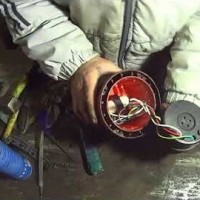
The washing machine has been serving us for probably six years now. At that time it was quite expensive and of high quality. Now the prices for equipment are simply enormous. I learned a lot of new information, but I still don’t believe that ordinary citric acid will help with such a problem as scale, especially since it has been collecting there for years. I'll try your method soon. By the way, my mother uses this method and speaks quite well of lemon juice.
My machine is already 13 years old, I only clean it with lemon.
Well, what kind of articles were they, I was just looking for “how to clean a washing machine with citric acid”, but there was a whole footcloth of a preface, what - and why, and a small paragraph “how to clean with citric acid”... which was all that was needed...
Well, don’t read, who forces it? What kind of sheep have they gone now, you see, they are too lazy to read. Who is the content made for? It’s better to have a detailed article than a less informative one. Uffff there is simply not enough evil for narrow-minded people like you.
For me, all these expensive anti-scale powders are not an indicator. I clean my machine only with citric acid. I have had my washing machine for a long time and wash it often. I even clean my electric kettle with citric acid. By the way, no specific smell described appears here, rubber parts do not burst, because citric acid does not corrode them. It’s already on the verge of fantasy, how much it needs to be poured in for it to corrode something.
For several years now I have also been using citric acid to clean and descale my washing machine. I usually do this about once a quarter. I just pour citric acid into the powder compartment and turn it on 90 degrees. No problems have been discovered so far. But now I’m thinking, I probably still need to be more careful with the lemon juice, otherwise you never know, and the equipment is now expensive.
We have very hard water, so once every six months I set the washing machine to 90 degrees and add a couple of packs of citric acid. Of course she eats everything up. But I couldn’t cope with the unpleasant smell. There is no smell in the drum, it’s just that when I take out the laundry after washing, it smells unpleasant, like stale, musty, very strong. And I don’t even know what to do.Can anyone give me any advice on how to deal with this? I tried adding additional rinse aid, but the problem did not go away.
Hello. After each wash, clean the cuffs of the machine, the drum, and the door. The drain filter and detergent container must be cleaned at least once a week with frequent washing, and the machine itself must be cleaned once every 3 months.
Use powder dosages recommended by the manufacturer on the packaging and, of course, choose products that contain water softening components. Wash at a temperature of 60 degrees. If nothing helps at all, install filters, for example, polyphosphate ones.
So I decided to clean my car. I took 150 g of lemon and set the wash to 95 degrees. As usual, after wiping the rubber cuff and other parts of the machine dry, I always leave the door open to dry completely. It even seemed that the car had the perfect smell of freshness) Although I hadn’t noticed any unpleasant odors before. But yesterday, 2 days later, I discovered a foul smell where the drum was... I'm shocked! Maybe I really need to do a few cleanings? I was a little upset. It turns out she made it even worse. The car is already 10 years old (if not more), and it has never been cleaned. We need to finish what we started.
I periodically clean the washing machine, everything is fine, there was an unpleasant smell from the washed clothes, I changed the washing powder and the problem went away.
I completely agree with Olga. If the machine does not smell, there is no smell inside the drum, then you need to change the powder, now most powders leave a musty smell and rinse aids do not solve this problem. Good laundry smell from Ariel capsules, from Laski.
If the laundry smells like “rotten water” after washing, the culprit is almost certainly the outlet separator hopper (already after the pump, almost at the outlet of the drain). It needs to be removed (not a job for girls) and washed completely (rinse as much as possible, then soak for a couple of hours in Tireta or another strongly alkaline pipe cleaner, then rinse clean again). On average, you have to do it about once every two years.
During washing, add a little white to the couvette and all the smell will go away. The smell is the activity of microbes that live in the machine. They are even added to powders to eat dirt; thermophilic ones are resistant to temperature.
One of the reasons for the cuff corroding (as in the photo) from the LC may be pouring the LC into a container, from where it is then washed out into the SM. Acid with a concentration of 100% falls through the glass of the machine onto the cuff, where it remains for almost the entire wash. Therefore, it is better to dilute the lacquer in three..four liters of sufficiently hot water and pour it into the drum before washing (if there is no preliminary pumping out before washing), or into the tray immediately after turning it on. This will eliminate the local impact of acid crystals on SM parts. I bet on 60 degrees - that’s enough. And an active rinse at the end.